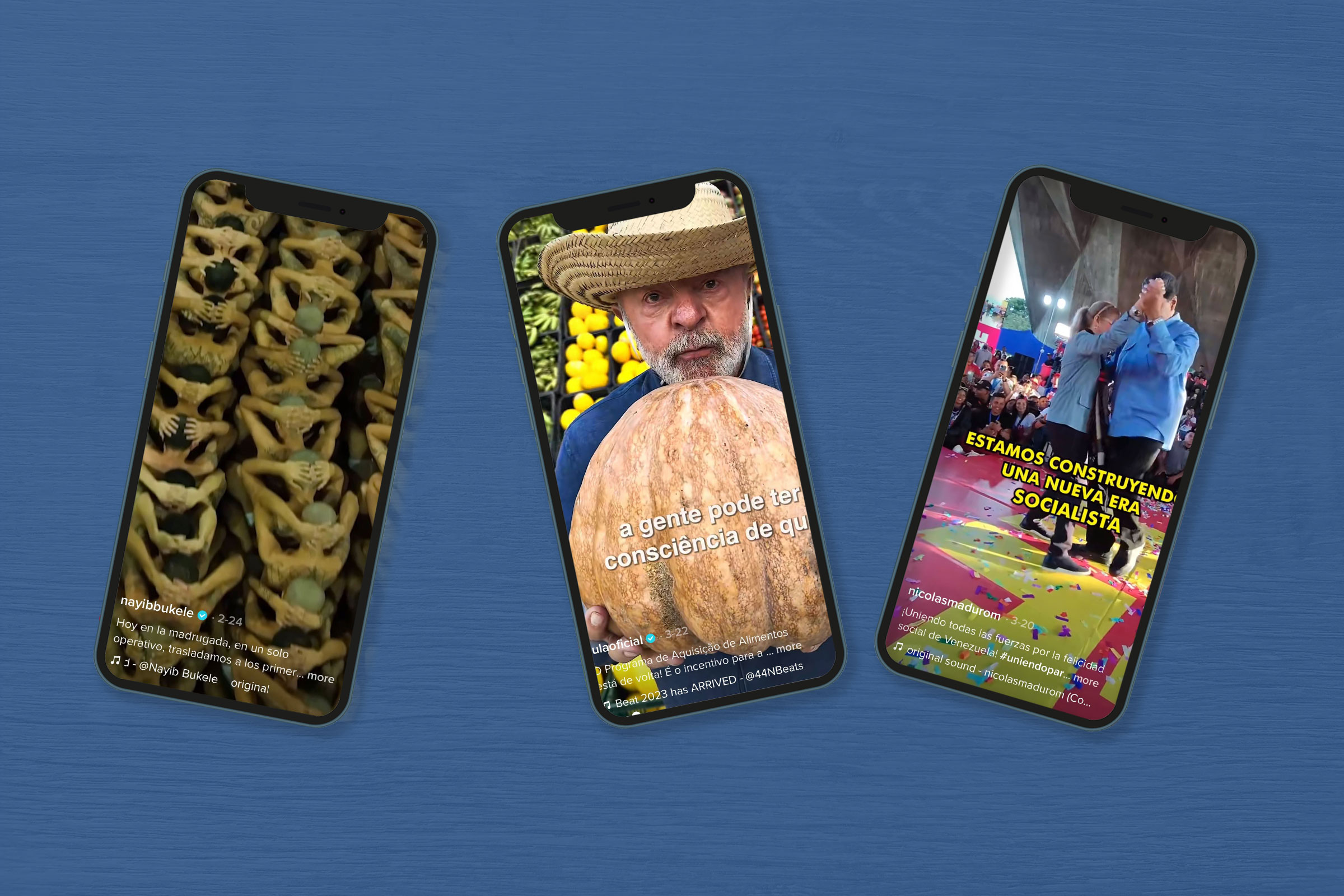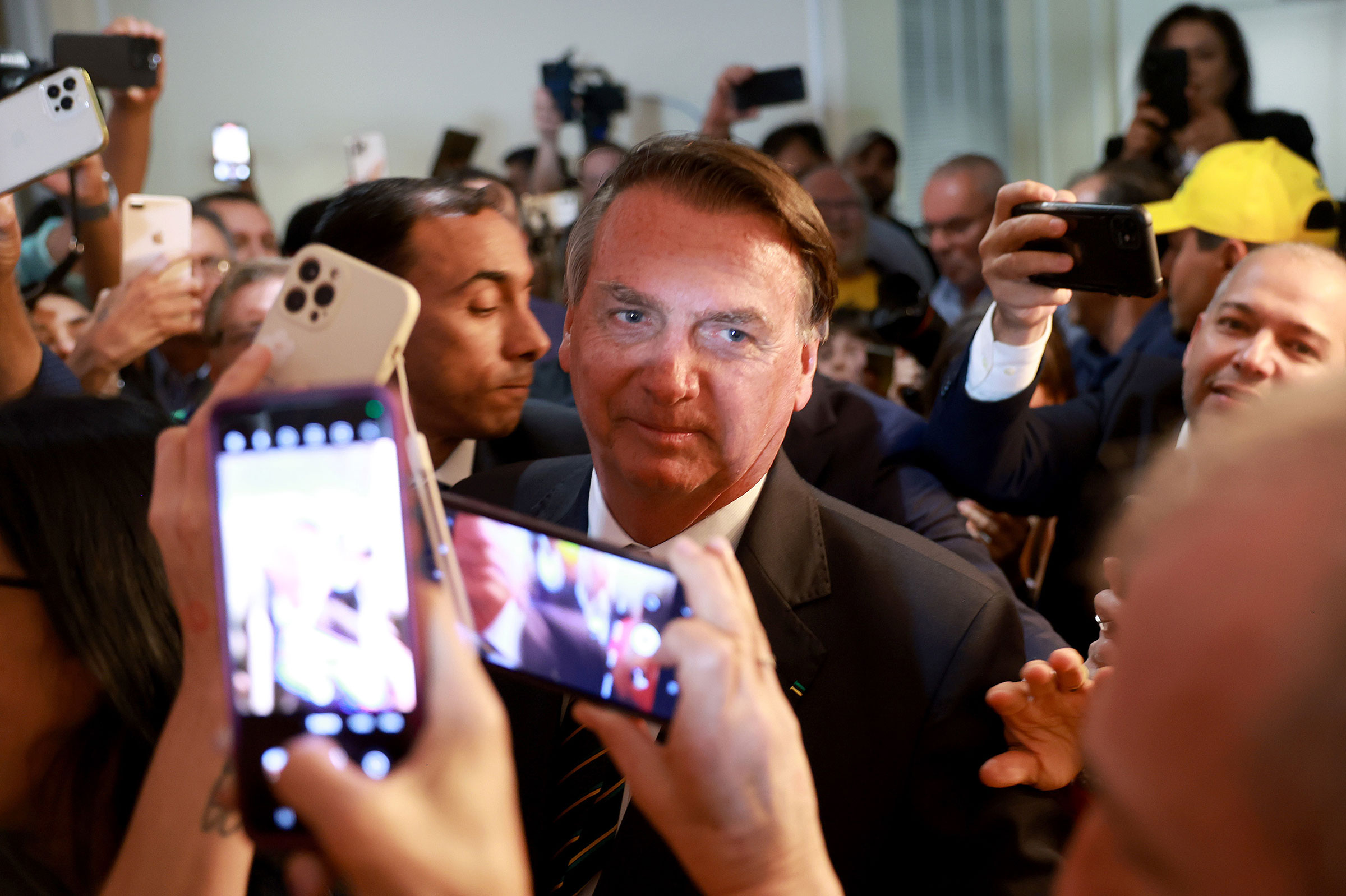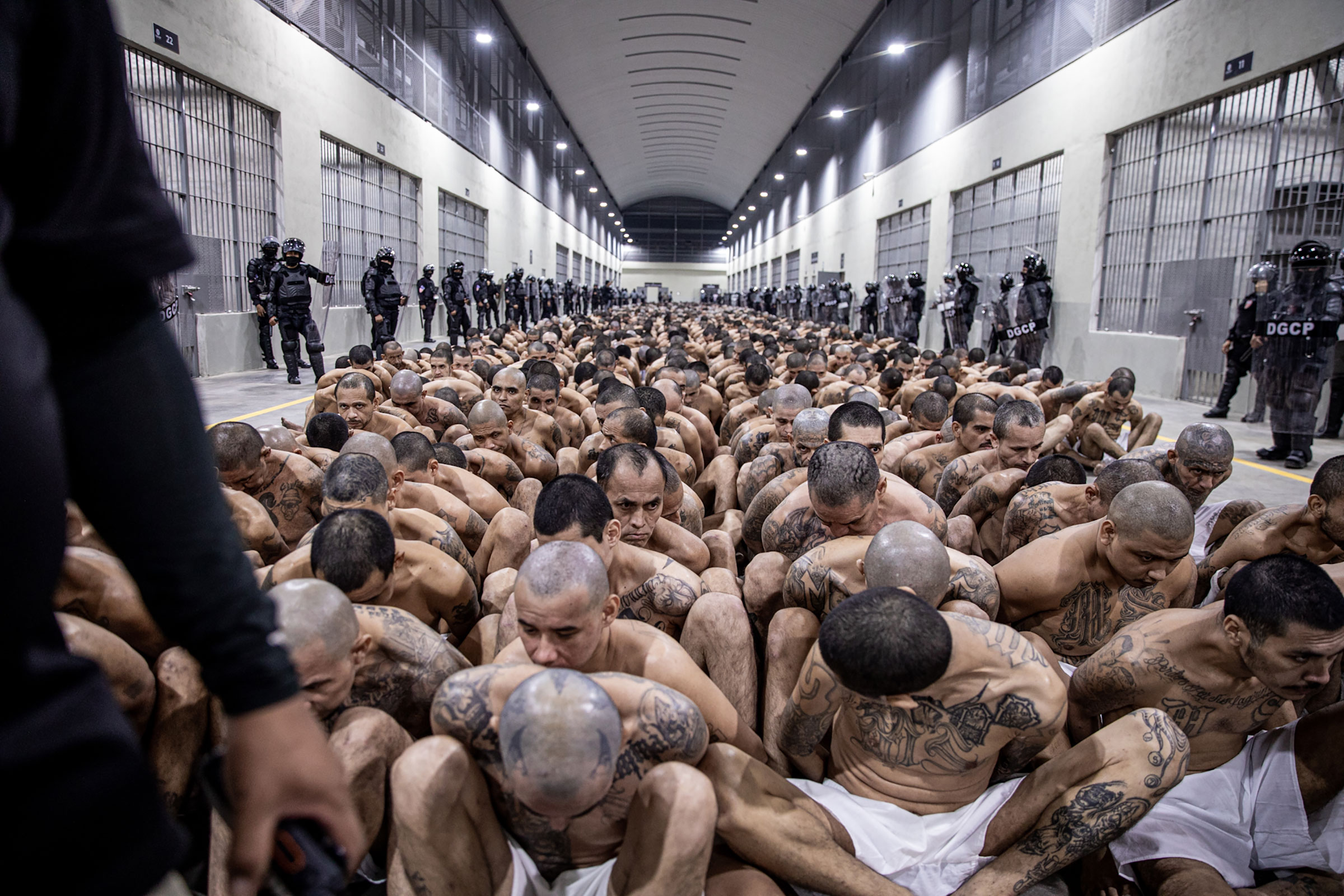
Hands held behind their heads, the prisoners in the video sprint down metal steps and into a massive concrete building. As dramatic music plays, the camera pans over thousands of men, arrayed in neat rows, clad only in white shorts, their heads shaved and bodies tattooed. High definition close-ups show their eyes glinting as they press their foreheads to their knees, before they are herded out by armed guards.
The footage shows the round-up of thousands of gang members in El Salvador’s newly opened “mega prison.” It’s not typical fare for TikTok, the video-sharing app that first became popular with teenagers for its viral dance challenges. But a pair of highly produced videos, posted by El Salvador President Nayib Bukele, showing the #GuerraContraLasPandillas—the war on gangs—have garnered 25 million views on the app since being posted in the past two months, with thousands of comments in more than a dozen languages expressing their admiration. “I wish you were the president of the entire world,” one user wrote in a comment liked 16,000 times.
Bukele’s use of TikTok is part of a regional trend. While President Joe Biden and his European counterparts have stayed away from TikTok, blocking it from government devices and weighing an outright ban due to national security concerns about its Chinese ownership, Latin American heads of state are embracing the massively popular platform more than ever. As of April 12, six of the top 10 world leaders on TikTok are from Central and South America. “Almost every single Latin American leader is on the app, and you can see the impact in the figures,” says Matthias Lüfkens, a former head of digital media at the World Economic Forum who tracks world leaders’ social media accounts. “They’re not following the U.S. lead of banning TikTok. They’re all in, [and] embracing the songs and the memes, which is very rare for any European politicians.”
Read More: Honduras Shows How Fake News Is Changing Latin American Elections
Latin American heads of state have long been early adopters of new social-media platforms. Now they have seized on TikTok as a less formal, more effective tool for all sorts of political messaging. In Venezuela, Nicolas Maduro has been using the platform to share bite-sized pieces of propaganda on the alleged successes of his socialist agenda, among dozens of videos of himself dancing salsa. In Ecuador, Argentina and Chile, presidents use the app to give followers a view behind the scenes of government. In Brazil, former President Jair Bolsonaro and his successor Luiz Inácio Lula da Silva have been competing for views in the aftermath of a contested election. Many leaders use the app to post short clips of their public speeches, interactions with citizens and travels, often set to songs trending on the app.
While politicians in the U.S. and Europe have raised concerns about the app, Latin American leaders don’t see China as an adversary in the same way, says Iria Puyosa, a senior research fellow at the Atlantic Council’s Digital Forensic Research Lab who is an expert on social media and political conflict in Latin America. China has invested heavily in the continent over the past two decades and forged close economic and security ties with most Latin American countries. It’s South America’s top trading partner, as well as a key source of both lending and direct foreign investment. “They see China as a partner,” Puyosa says. “This a way to reach people where the people are—people who distrust the news and are disengaged by electoral politics.” In much of the West, TikTok is the subject of political suspicion; in Latin America, it’s a cornerstone of political strategy.
None have done this more effectively than El Salvador’s Bukele. With 5.6 million followers, he is the most popular head of state on the app—no small feat for the leader of a Central American country with a population of 6.3 million. The son of a wealthy businessman, Bukele started his career in public relations, working for his family’s advertising firm. Since being elected in 2019, at age 35, he has set up a slick digital operation to manage his image and publicize his policies, from an experiment to adopt Bitcoin as the national currency to the declaration of a state of emergency to crack down on the gangs that have terrorized the country for decades. It has helped Bukele notch an approval rating that hovers around 90%.
TikTok is a large part of the alternative media landscape Bukele has built since his inauguration, tightly controlling and often manipulating the information disseminated through TV shows, video streaming sites, social media, and paid Internet trolls, experts say. TikTok can be easier to manipulate than other social platforms, says Alberto Escorcia, a Mexican social media analyst whose analysis of Bukeke’s profiles found an “overwhelming” amount of manipulation to shape public opinion. “A small army of operators can quickly inflate the statistics to appear in the TikTok recommendations algorithm.” (TikTok did not return a request for comment.)
This isn’t a new tactic in Latin America. Ecuador became an early pioneer in Twitter troll farms in 2013, when a company tied to then-president Rafael Correa began to monetize them by hijacking trending topics. Since then, digital armies have become a lucrative business from Brazil to Mexico, especially around presidential elections. Digital staffers who worked for other Latin American campaigns, including former Mexican President Enrique Peña Nieto, “helped advise Bukele in the creation of this massive communications strategy,” says Escorcia.
His counterparts across the continent are using the app in different ways. The drama of Brazil’s contested presidential election has given way to a split-screen of TikTok accounts, with Bolsonaro (5.3 million followers) and Lula (4.3 million followers) both highly active in different ways. During his three-month self-imposed exile in Florida, Bolsonaro released a stream of videos, set to emotive music, that showed lines of supporters waiting to shake his hand or take a photo. In others he is giving speeches at right-wing events in the area, touting his accomplishments and vowing to return to his country. But mostly he posts humanizing, light-hearted videos—getting a haircut, cooking hot dogs in a suburban kitchen, playing with dogs and children.

“Bolsonaro was the first Brazilian president to adopt a 100% online communication strategy,” says Karina di Nubila, a lawyer and researcher at the University of Valladolid in Spain. He is using TikTok as the “soundtrack” of his comeback, says Di Nubila. “He is creating a plot: the story of the hero, the populist leader, charismatic, loved by Brazilians, who lost the election in an unfair, coup-like and fraudulent way, but who, despite everything, will not abandon his people.” On March 30, a video of his return to Brazil was viewed almost two million times.
Read More: Inside Bolsonaro’s Surreal New Life as a Florida Man—And MAGA Darling
Since his inauguration, Lula’s account has been posting frequent videos of him fulfilling presidential duties: waving atop a Brazilian-made submarine, opening health clinics, showing off tropical produce, meeting world leaders. Many of them are set to TikTok trends and popular songs, with one describing his agenda of “putting food on the table of the Brazilian people” and “job opportunities for all” as his “vibe.”
Across Brazil’s northwestern border, Venezuela’s Maduro has posted more than 90 videos on TikTok this year alone. Some are short political sound bites set to music; others show ordinary antics, like playing with a 360-degree camera in his office, or feature the president dancing. In one recent video that garnered 3.4 million views, he’s being smothered by four golden retrievers as he fruitlessly commands them to sit. The Venezuela shown through Maduro’s TikTok is vibrant and thriving—a far cry from the reality of an economy in shambles, rampant hyperinflation, and an ongoing humanitarian crisis in which most of the country struggles to afford food or access basic medicines. “We have to win the battle every day, with intelligence,” Maduro said in a speech last month. “You know how one wins this? On TikTok.”
Other Latin American leaders use the app to showcase their policies. Ecuadorian President Guillermo Lasso, who has 1.3 million followers, speaks directly to the camera, showing the opening of housing projects and hospitals. Colombian President Gustavo Petro’s videos largely consist of clips of his speeches set to music and scenes from his daily activities. Chilean President Gabriel Boric has an account with 638,000 followers with a more somber tone, in which he shows himself visiting disaster zones and meeting with citizens. Boric, who won the presidency in 2021 at just 35, “is doing this very serious, staid thing, talking about his policy in a very formal way,” says Puyosa. “I guess he doesn’t need to overdo it—he’s already cool.”

Latin American governments’ embrace of TikTok stands in increasingly stark contrast to the U.S. and Europe, where leaders have never had much enthusiasm for the platform. The U.S. government is clearly aware of its reach: Americans make up the world’s largest TikTok audience, with 150 million users. When the war in Ukraine broke out last year the White House hosted TikTok influencers for a briefing, acknowledging the app as a dominant source of news and information. Biden’s staff also plans to enlist hundreds of TikTok creators as part of the digital strategy for his expected re-election campaign in 2024.
But long-held fears over the app’s data access and Chinese ownership have mounted in recent months. In a high-profile hearing in March, FBI Director Christopher Wray warned that TikTok “screams national security concerns.” Since then, the app has been banned from government devices in the U.S., U.K., Canada, the European Union, and an expanding list of other European countries. Several European government officials deleted accounts, including the Czech government, the European Commission, and Latvia’s foreign minister, who cited “security reasons.” Despite having an account set up under former Prime Minister Boris Johnson, the U.K.’s official 10 Downing Street account hasn’t posted since last summer.
One exception is French President Emmanuel Macron, who launched his TikTok account in July 2020 and has amassed 4 million followers with well-lit videos where he speaks to the camera and answers user comments. Even so, France banned TikTok on government devices last month.
“In the U.S. and in Europe, there is this disconnect right now, where you have the government saying no TikTok on government phones, and there’s a conversation around national security, but we still haven’t addressed the fact that governments are pretty out of touch with populations and the public,” says Jiore Craig, who oversees election research at the Institute for Strategic Dialogue, a think tank that focuses on online disinformation. “Are you doing social media because you have to, or are you doing social media because you understand why it’s important?”
For many leaders in Latin America, the answer is clear—and already yielding results. In recent months, Bukele has begun adding English subtitles to his videos as he works to grow a global audience of admirers and uses the app to hit back at critics abroad. “Where did they get this sudden love for El Salvador?” he says in one TikTok, translated into English on the screen, addressing human rights organizations’ concerns over the sprawling new prisons he has highlighted in his videos. “Up until recently, they couldn’t find it on a map.”
More Must-Reads from TIME
- Cybersecurity Experts Are Sounding the Alarm on DOGE
- Meet the 2025 Women of the Year
- The Harsh Truth About Disability Inclusion
- Why Do More Young Adults Have Cancer?
- Colman Domingo Leads With Radical Love
- How to Get Better at Doing Things Alone
- Michelle Zauner Stares Down the Darkness
Write to Vera Bergengruen at vera.bergengruen@time.com